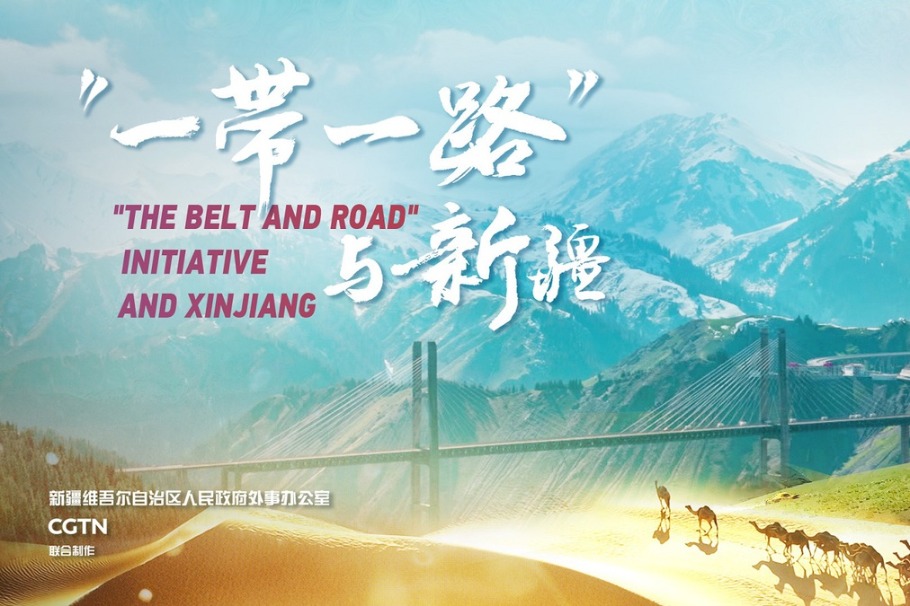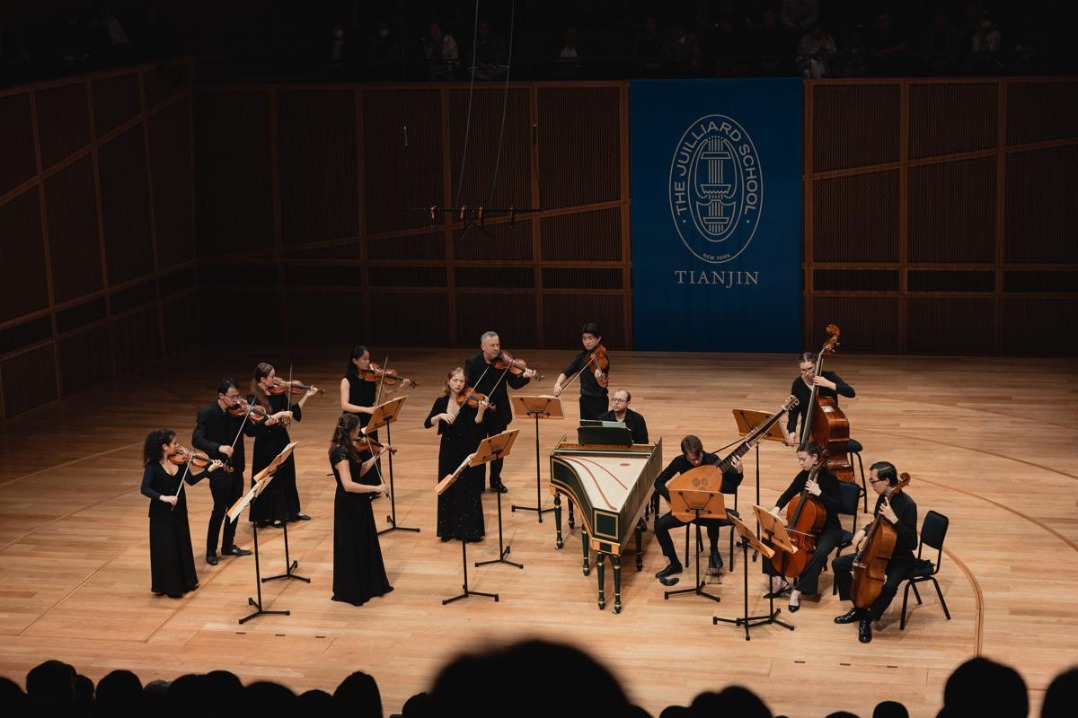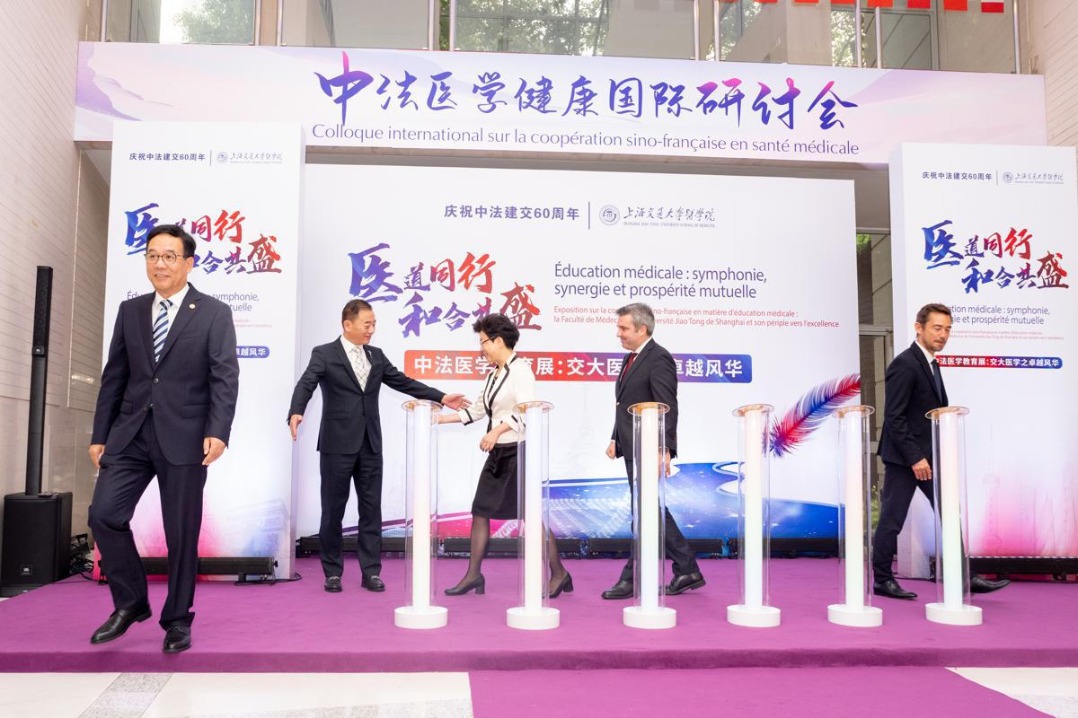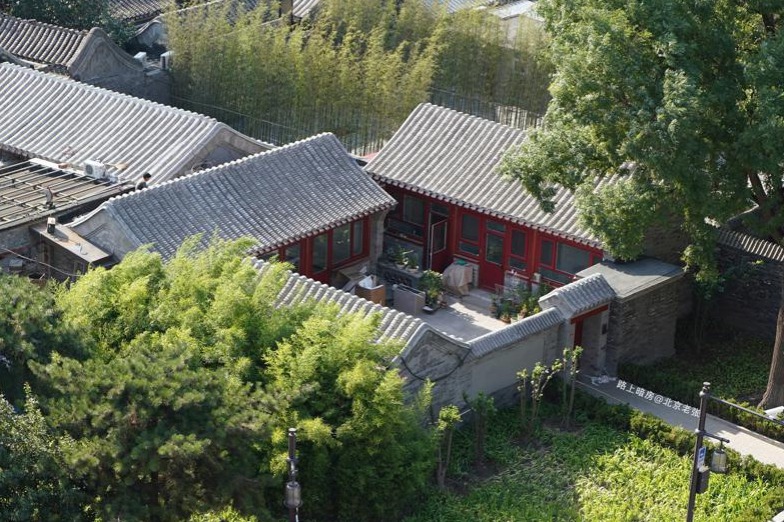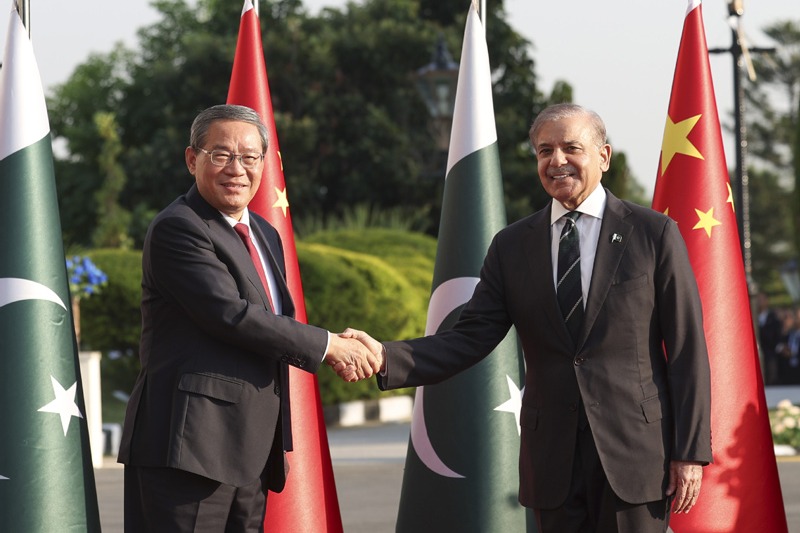Retired mayor goes from front office back to fields

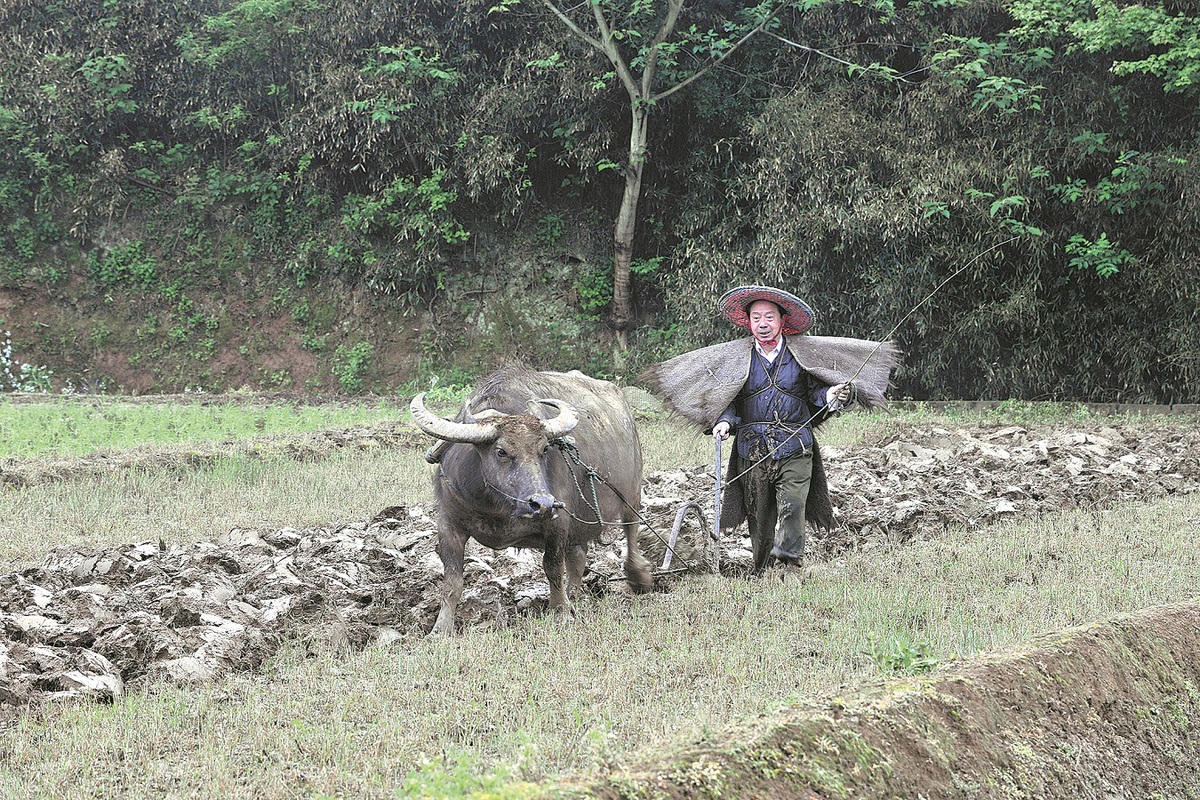
In the tiny Licun village of the Western Lake in Nanchang, Jiangxi province, former mayor Li Douluo has become a big star. Visitors flock there in hopes of meeting and taking pictures with him.
Li returned to the village to resume farming after retiring in 2010. In 2020, he decided to venture into social media and created an account on Douyin, a short video platform. The move turned him into an online sensation, leading him to amass over 350,000 followers.
In his videos, the 78-year-old sports a slicked-back hairstyle and is clad in practical camouflage attire, his go-to uniform for when he's participating in agricultural activities.
In one of his most liked videos, Li sits by the roadside, holding a flatbread in one hand and with a basket of vegetables at his feet.
Looking into the camera, he imparts life wisdom to his young followers.
"If I have a flatbread and I give you half, that's friendship. If I take a bite and give the rest to you, that's love. If I give you all the flatbread, that's parental love. But if one hides it while telling you he is hungry and looking for food, you should avoid that person. He is not worth befriending."
Young viewers appreciate Li's ability to simplify profound life philosophies with relatable and simple metaphors. In other videos, he joins residents in planting crops and showcases the picturesque rural life of the village, also known in Chinese as Xihu Licun, a clean place with babbling streams, and lush trees that is a poster child for prosperity in a modern rural community.
Licun village has garnered numerous honors. In January 2011, it was recognized as one of China's happiest villages, and two years later, it was designated a national 3A-level tourist attraction, the third highest rating for scenic spots. It was also awarded the title "Most beautiful leisure village in China" and was deemed a provincial-level ecological village.
The journey of its rural development can be traced back to Jan 22, 2010.
That morning, Li, former mayor of Nanchang and then head of the Nanchang People's Congress Standing Committee, delivered his final speech before his retirement, unveiling a long-planned decision to return to Licun village and become a farmer again.
Four hours after stepping down from the podium, he and his wife arrived in the village where he grew up, ready to immerse themselves in the development of the rural community.
"That day, after finishing my speech, everyone applauded and laughed while looking at me. They were curious about what I would do in the afternoon. I told them I would return to the countryside, become a farmer and serve as an adviser to build a new socialist countryside," Li said.
Born in 1946 in Licun village, he spent his early life as a diligent farmer before joining the production brigade, which managed crops and financing.
"I could handle all the farming tasks in Nanchang," he said.
Li joined the Communist Party of China in 1970. Rising through the ranks, he became Party secretary of Jinxian county in 1980 and was elected mayor of Nanchang in 2001. Five years later, he assumed the position of chairman of the Nanchang People's Congress Standing Committee.
"I've spent over 40 years constantly changing roles and stages. I transitioned from the political to the social stage this time," Li said.
Back in the rural community, the first thing on Li's to-do list was to improve the village's appearance.
Because Licun village has a history of more than 600 years and still features many houses built during the Ming (1368-1644) and Qing (1644-1911) dynasties, Li hired a skilled team specializing in ancient architectural restoration.
They customized repair plans based on the degree of damage, striving to preserve the original style of the buildings.
He also launched tree-planting projects, leading villagers to transform the landscape into a lush, green environment.
"Our village has pursued the integration of mountains and waters, pastoral scenes and agricultural culture. As a result, the water here is drinkable," he said. "And look at the birds here, their presence cannot be bought no matter how much money you have."
Li, who has been involved in rural development for decades, believes that urbanization does not necessarily imply the spatial shift of population and industry. It's more about emulating the urban way of life and modern civilization to transform rural areas.
The village development project initiated by Li is a form of "tailored urbanization" for rural modernization, he said.
Li has illuminated streets, courtyards and squares with nearly 200 streetlights to address concerns about the limited nighttime activities for villagers. To facilitate transportation, he organized an initiative to pave nearly 10 kilometers of concrete roads and constructed several bridges in the village.
"Rural construction is about making people's lives convenient and happy. If the villagers say it's good, then it's good," he said.
In the summer of 2020, Jiangxi experienced widespread heavy rainfall and extreme weather conditions, resulting in unprecedented flooding in the Poyang Lake Basin. The deluges affected over 9 million people in the province, causing direct economic losses of over 34 billion yuan ($4.7 billion).
Licun village, situated near Qinglan Lake, also faced an urgent situation as floodwaters surpassed warning levels. In a video posted on Douyin, Li and villagers can be seen working tirelessly to rescue farmland, toiling all day and night to plug a levee breach in a dam.
"In 1998, during a major flood disaster across the country, I was Nanchang's chief commander for flood control. I have experience and responsibility. Faced with such a situation in 2020, I had to lead by example," Li said.
Over the past decade, Li has organized efforts to strengthen levees, construct drainage ditches and build three drainage stations. The agricultural transformation of more than 193 hectares of fields has led to an average increase of more than 3 metric tons of grain per hectare.
"Now our village is significantly different from before, becoming a nationally civilized village and a beautiful rural area in Jiangxi province. The rural environment is also very civilized," Li said.
"In our village, people are going to college, but no one has been to prison. There is mutual assistance and no theft or fighting. The village has been recognized as a 'dispute-free village', meaning no one has been to court, and none of us has had disputes. Now, everyone here finds a way to make a living, arrangements are made for the disabled and assistance is provided to those facing difficulties."
The village's transformation has attracted many investors who want to build factories and set up industries. However, Li has rejected all their proposals.
"They come here to make money, either occupying mountains or fields, filling ponds or cutting trees," he explained. "I don't want any of that. I want to preserve the style of water towns."
Instead, Li is guiding the village's future toward rural tourism.
Tourist attractions such as the Agricultural Museum, the Wugang Villa, the Lotus Pond and the Longxi Shrine have been built over the past decade with his guidance.
During peak season, the village accommodates tens of thousands of tourists a year.
Li's efforts have earned him recognition as a Chinese cultural figure, and he has been named one of the top 10 heartwarming figures in the rural areas of Jiangxi.
Li said he enjoyed being mayor, but he is also happy being a farmer again. He acknowledged that both jobs posed unique challenges.
"Being a mayor requires a lot of mental strength, and it's mentally exhausting. You must manage economic work, improve the city's appearance and do almost everything. But being a farmer is physically tiring."
After Li became an internet celebrity, the company that collaborated with him on his videos wanted him to engage in commercial livestreaming, but he turned it down.
"In 2020, a man from the company told me that short videos and livestreaming are viral among youngsters and suggested I give it a shot to promote our village. I said I would only do it if it was about promoting Jiangxi and Nanchang, and I wouldn't take a penny from it. Also, everything involved in the short video shooting should comply with national and industry regulations," Li said.
Jiang Qiang, a publicity officer in Qianfang town in Jinxian county, where the village is located, said, "The video company withdrew its offer, and now villagers help the boss make videos from time to time."
Jiang added that Li has endeared himself to everyone in the village by leading the community in various endeavors.
"We all call him 'the boss' as a sign of intimacy and respect," he said.
Huang Kailu, a college graduate who has served as a village official in Licun for half a year, said Li is warmly welcomed by villagers and is approachable to newcomers like her.
For Li, it doesn't matter whether he is a cyber star.
"I don't care about being an internet celebrity. I only look at the results. If it benefits society, has a positive impact and is useful, I am happy to participate. If it doesn't bring any benefits, I won't be involved," he said.
"I hope our village can set an example for constructing new rural areas."
- Election results for Macao's sixth-term chief executive confirmed by top court
- Senior Chinese military official meets Russian defense minister
- Former political advisor of Xinjiang arrested for suspected bribe-taking
- Full cooperation for smooth transition to new governmental team, says Ho Iat-seng
- Hong Kong-born giant panda cubs leave incubators, develop distinctive markings
- China's top political advisor urges uniting private sector toward Chinese modernization


















